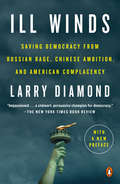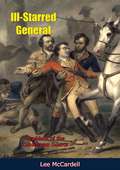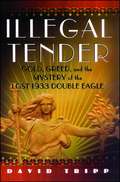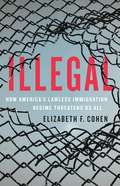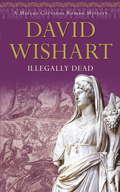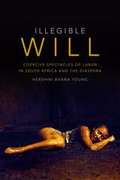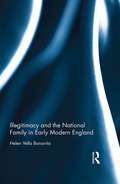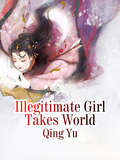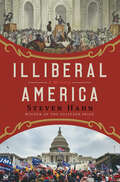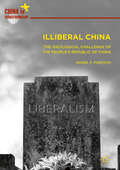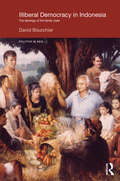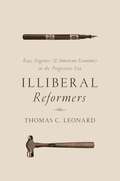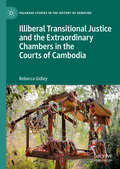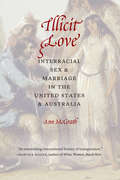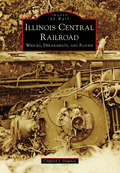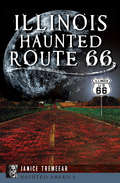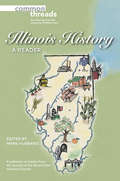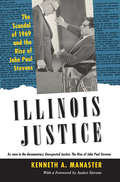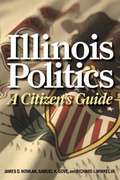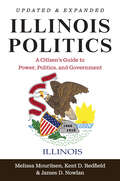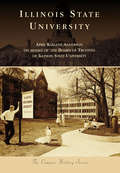- Table View
- List View
Ill Winds: Saving Democracy from Russian Rage, Chinese Ambition, and American Complacency
by Larry DiamondFrom America’s leading scholar of democracy,a personal, passionate call to action against the rising authoritarianism that challenges our world order—and the very value of libertyLarry Diamond has made it his life's work to secure democracy's future by understanding its past and by advising dissidents fighting autocracy around the world. Deeply attuned to the cycles of democratic expansion and decay that determine the fates of nations, he watched with mounting unease as illiberal rulers rose in Hungary, Poland, Turkey, the Philippines, and beyond, while China and Russia grew increasingly bold and bullying. Then, with Trump's election at home, the global retreat from freedom spread from democracy's margins to its heart. Ill Winds' core argument is stark: the defense and advancement of democratic ideals relies on U.S. global leadership. If we do not reclaim our traditional place as the keystone of democracy, today's authoritarian swell could become a tsunami, providing an opening for Vladimir Putin, Xi Jinping, and their admirers to turn the twenty-first century into a dark time of despotism.We are at a hinge in history, between a new era of tyranny and an age of democratic renewal. Free governments can defend their values; free citizens can exercise their rights. We can make the internet safe for liberal democracy, exploit the soft, kleptocratic underbelly of dictatorships, and revive America's degraded democracy. Ill Winds offers concrete, deeply informed suggestions to fight polarization, reduce the influence of money in politics, and make every vote count. In 2019, freedom's last line of defense still remains "We the people."
Ill-Starred General: Braddock of the Coldstream Guards
by Lee McCardellA rare combination of documented fact and good storytelling, Ill-Starred General is the biography of a much maligned man from one of history’s most vital eras. The career of Edward Braddock began during the court intrigues of Queen Anne and George I, gained momentum in continental military campaigns in the early 1750s, and ended abruptly in the rout of his American army near present-day Pittsburgh in 1755. This highly acclaimed biography reveals the man—and the politics—behind his defeat, one of the major setbacks to British imperial power in the American colonies.“Braddock was the first English general that Americans had ever seen in action, and although he lost his life fighting for them, they detested him...What [McCardell] has done is to replace a historical puppet with a credible human being, and...to explain how a carefully planned colonial expedition can go wrong.”—Naomi Bliven, The New Yorker“The breadth, depth and care of McCardell’s research on Ill-Starred General are amazing and delightful. He has labored with that fidelity which every honest historian must display and with that luck which crowns the efforts of the fortunate.”—George Swetnam, Pittsburgh Press“A first-rate biography.”—Lynn Montross, New York Times“A genial and readable interpretation that will revivify an important figure in early American history. It is the kind of well-documented book that will appeal to both the general reader and the historian.”—W. R. Jacobs, American Historical Review
Illegal Tender: Gold, Greed, and the Mystery of the Lost 1933 Double Eagle
by David TrippIt's the most valuable ounce of gold in the world, the celebrated, the fabled, the infamous 1933 double eagle, illegal to own and coveted all the more, sought with passion by men of wealth and with steely persistence by the United States government for more than a half century—it shouldn't even exist but it does, and its astonishing, true adventures read like "a composite of The Lord of the Rings and The Maltese Falcon" (The New York Times). In 1905, at the height of the exuberant Gilded Age, President Theodore Roosevelt commissioned America's greatest sculptor, Augustus Saint-Gaudens—as he battled in vain for his life—to create what became America's most beautiful coin. In 1933 the hopes of America dimmed in the darkness of the Great Depression, and gold—the nation's lifeblood—hemorrhaged from the financial system. As the economy teetered on the brink of total collapse, Franklin Delano Roosevelt, in his first act as president, assumed wartime powers while the nation was at peace and in a "swift, staccato action" unprecedented in United States history recalled all gold and banned its private ownership. But the United States Mint continued, quite legally, to strike nearly a half million 1933 double eagles that were never issued and were deemed illegal to own. In 1937, along with countless millions of other gold coins, they were melted down into faceless gold bars and sent to Fort Knox. The government thought they had destroyed them all—but they were wrong. A few escaped, purloined in a crime—an inside job—that wasn't discovered until 1944. Then, the fugitive 1933 double eagles became the focus of a relentless Secret Service investigation spearheaded by the man who had put away Al Capone. All the coins that could be found were seized and destroyed. But one was beyond their reach, in a king's collection in Egypt, where it survived a world war, a revolution, and a coup, only to be lost again. In 1996, more than forty years later, in a dramatic sting operation set up by a Secret Service informant at the Waldorf-Astoria, an English and an American coin dealer were arrested with a 1933 double eagle which, after years of litigation, was sold in July 2002 to an anonymous buyer for more than $7.5 million in a record-shattering auction. But was it the only one? The lost one? Illegal Tender, revealing information available for the first time, tells a riveting tale of American history, liberally spiced with greed, intrigue, deception, and controversy as it follows the once secret odyssey of this fabulous golden object through the decades. With its cast of kings, presidents, government agents, shadowy dealers, and crooks, Illegal Tender will keep readers guessing about this incomparable disk of gold—the coin that shouldn't be and almost wasn't—until the very end.
Illegal: How America's Lawless Immigration Regime Threatens Us All
by Elizabeth F. CohenA political scientist explains how the American immigration system ran off the rails -- and proposes a bold plan for reform Under the Trump administration, US immigration agencies terrorize the undocumented, target people who are here legally, and even threaten the constitutional rights of American citizens. How did we get to this point? In Illegal, Elizabeth F. Cohen reveals that our current crisis has roots in early twentieth century white nationalist politics, which began to reemerge in the 1980s. Since then, ICE and CBP have acquired bigger budgets and more power than any other law enforcement agency. Now, Trump has unleashed them. If we want to reverse the rising tide of abuse, Cohen argues that we must act quickly to rein in the powers of the current immigration regime and revive saner approaches based on existing law. Going beyond the headlines, Illegal makes clear that if we don't act now all of us, citizen and not, are at risk.
Illegally Dead
by David WishartWhen Corvinus receives a letter, with a tantalising PS, from his adopted daughter, Marilla, mentioning there might have been a murder, he hot-foots it to Castrimoenium at once. Not that everyone agrees that Lucius Hostilius was murdered. Poison was apparently the means of death, but Lucius was terminally ill: it was only a matter of time. Although he hasn't any official investigative status, Corvinus can't resist doing a little amateur sleuthing. And he has barely begun when two other corpses turn up and he is formally on the case. Lucius had been suffering something of a personality change because of his illness, so there is no shortage of suspects among friends and family whom he had antagonised. But Corvinus goes up many a blind alley before arriving at the heart of the mystery. As we follow Marcus Corvinus, clue by clue, on his twelfth case, we allow ourselves to be pleasurably diverted by rumours of Meton's love life - and by an authentic recipe for fish pickle sauce . . .
Illegally Dead
by David WishartWhen Corvinus receives a letter, with a tantalising PS, from his adopted daughter, Marilla, mentioning there might have been a murder, he hot-foots it to Castrimoenium at once. Not that everyone agrees that Lucius Hostilius was murdered. Poison was apparently the means of death, but Lucius was terminally ill: it was only a matter of time. Although he hasn't any official investigative status, Corvinus can't resist doing a little amateur sleuthing. And he has barely begun when two other corpses turn up and he is formally on the case. Lucius had been suffering something of a personality change because of his illness, so there is no shortage of suspects among friends and family whom he had antagonised. But Corvinus goes up many a blind alley before arriving at the heart of the mystery. As we follow Marcus Corvinus, clue by clue, on his twelfth case, we allow ourselves to be pleasurably diverted by rumours of Meton's love life - and by an authentic recipe for fish pickle sauce . . .
Illegible Will: Coercive Spectacles of Labor in South Africa and the Diaspora
by Hershini Bhana YoungIn Illegible Will Hershini Bhana Young engages with the archive of South African and black diasporic performance to examine the absence of black women's will from that archive. Young argues for that will's illegibility, given the paucity of materials outlining the agency of black historical subjects. Drawing on court documents, novels, photographs, historical records, websites, and descriptions of music and dance, Young shows how black will can be conjured through critical imaginings done in concert with historical research. She critically imagines the will of familiar subjects such as Sarah Baartman and that of obscure figures such as the eighteenth-century slave Tryntjie of Madagascar, who was executed in 1713 for attempting to poison her mistress. She also investigates the presence of will in contemporary expressive culture, such as the Miss Landmine Angola beauty pageant, placing it in the long genealogy of the freak show. In these capacious case studies Young situates South African performance within African diasporic circuits of meaning throughout Africa, North America, and South Asia, demonstrating how performative engagement with archival absence can locate that which was never recorded.
Illegitimacy and the National Family in Early Modern England
by Helen Vella BonavitaThis study considers the figure of the bastard in the context of analogies of the family and the state in early modern England. The trope of illegitimacy, more than being simply a narrative or character-driven issue, is a vital component in the evolving construction and representation of British national identity in prose and drama of the sixteenth and early seventeenth century. Through close reading of a range of plays and prose texts, the book offers readers new insight into the semiotics of bastardy and concepts of national identity in early modern England, and reflects on contemporary issues of citizenship and identity. The author examines play texts of the period including Bale's King Johan, Peele's The Troublesome Reign of John, and Shakespeare's King John, Richard II, and King Lear in the context of a selection of legal, religious, and polemical texts. In so doing, she illuminates the extent to which the figure of the bastard and, more generally the trope of illegitimacy, existed as a distinct discourse within the wider discursive framework of family and nation.
Illegitimate Girl Takes World: Volume 1 (Volume 1 #1)
by Qing YuAt the peak of Mount Kunlun, at the precipice of a tall cliff, a fierce wind blew. A full moon hung high above the vast curtain of darkness. A woman covered in blood stumbled as she stepped on the broken stones. In the end, she had nowhere to retreat to …
Illegitimate Girl Takes World: Volume 2 (Volume 2 #2)
by Qing YuAt the peak of Mount Kunlun, at the precipice of a tall cliff, a fierce wind blew. A full moon hung high above the vast curtain of darkness. A woman covered in blood stumbled as she stepped on the broken stones. In the end, she had nowhere to retreat to …
Illegitimate Girl Takes World: Volume 3 (Volume 3 #3)
by Qing YuAt the peak of Mount Kunlun, at the precipice of a tall cliff, a fierce wind blew. A full moon hung high above the vast curtain of darkness. A woman covered in blood stumbled as she stepped on the broken stones. In the end, she had nowhere to retreat to …
Illiberal America: A History
by Steven HahnIf your reaction to the January 6, 2021, insurrection at the Capitol was to think, 'That’s not us,' think again: in Illiberal America, a Pulitzer Prize–winning historian uncovers a powerful illiberalism as deep seated in the American past as the founding ideals. A storm of illiberalism, building in the United States for years, unleashed its destructive force in the Capitol insurrection of January 6, 2021. The attack on American democracy and images of mob violence led many to recoil, thinking “That’s not us.” But now we must think again, for Steven Hahn shows in his startling new history that illiberalism has deep roots in our past. To those who believe that the ideals announced in the Declaration of Independence set us apart as a nation, Hahn shows that Americans have long been animated by competing values, equally deep-seated, in which the illiberal will of the community overrides individual rights, and often protects itself by excluding perceived threats, whether on grounds of race, religion, gender, economic status, or ideology. Driven by popular movements and implemented through courts and legislation, illiberalism is part of the American bedrock. The United States was born a republic of loosely connected states and localities that demanded control of their domestic institutions, including slavery. As white settlement expanded west and immigration exploded in eastern cities, the democracy of the 1830s fueled expulsions of Blacks, Native Americans, Catholics, Mormons, and abolitionists. After the Civil War, southern states denied new constitutional guarantees of civil rights and enforced racial exclusions in everyday life. Illiberalism was modernized during the Progressive movement through advocates of eugenics who aimed to reduce the numbers of racial and ethnic minorities as well as the poor. The turmoil of the 1960s enabled George Wallace to tap local fears of unrest and build support outside the South, a politics adopted by Richard Nixon in 1968. Today, with illiberalism shaping elections and policy debates over guns, education, and abortion, it is urgent to understand its long history, and how that history bears on the present crisis.
Illiberal China: The Ideological Challenge of the People's Republic of China (China in Transformation)
by Daniel F. VukovichThis book analyzes the 'intellectual political culture' of post-Tiananmen China in comparison to and in conflict with liberalism inside and outside the P.R.C. How do mainland politics and discourses challenge ‘our’ own, chiefly liberal and anti-‘statist’ political frameworks? To what extent is China paradoxically intertwined with a liberal economism? How can one understand its general refusal of liberalism, as well as its frequent, direct responses to electoral democracy, universalism, Western media, and other normative forces? Vukovich argues that the Party-state poses a challenge to our understandings of politics, globalization, and even progress. To be illiberal is not necessarily to be reactionary and vulgar but, more interestingly, to be anti-liberal and to seek alternatives to a degraded liberalism. In this way Chinese politics illuminate the global conjuncture, and may have lessons in otherwise bleak times.
Illiberal Democracy in Indonesia: The Ideology of the Family State (Politics in Asia)
by David BourchierIlliberal Democracy in Indonesia charts the origins and development of organicist ideologies in Indonesia from the early 20th century to the present. In doing so, it provides a background to the theories and ideology that informed organicist thought, traces key themes in Indonesian history, examines the Soeharto regime and his ‘New Order’ in detail, and looks at contemporary Indonesia to question the possibility of past ideologies making a resurgence in the country. Beginning with an exploration of the origins of the theory of the organic state in Europe, this book explores how this influenced many young Indonesian scholars and ‘secular’ nationalists. It also looks in detail at the case of Japan, and identifies the parallels between the process by which Japanese and Indonesian nationalist scholars drew on European romantic organicist ideas to forge ‘anti-Western’ national identities and ideologies. The book then turns to Indonesia’s tumultuous history from the revolution to 1965, the rise of Soeharto, and how his regime used organicist ideology, together with law and terror, to shape the political landscape consolidate control. In turn, it shows how the social and economic changes wrought by the government’s policies, such as the rise of a cosmopolitan middle class and a rapidly growing urban proletariat led to the failure of the corporatist political infrastructure and the eventual collapse of the New Order in 1998. Finally, the epilogue surveys the post Soeharto years to 2014, and how growing disquiet about the inability of the government to contain religious intolerance, violence and corruption, has led to an increased readiness to re-embrace not only more authoritarian styles of rule but also ideological formulas from the past. This book will be welcomed by students and scholars of Southeast Asia, politics and political theory, as well as by those interested in authoritarian regimes, democracy and human rights.
Illiberal Reformers: Race, Eugenics, and American Economics in the Progressive Era
by Thomas C. LeonardIn Illiberal Reformers, Thomas Leonard reexamines the economic progressives whose ideas and reform agenda underwrote the Progressive Era dismantling of laissez-faire and the creation of the regulatory welfare state, which, they believed, would humanize and rationalize industrial capitalism. But not for all. Academic social scientists such as Richard T. Ely, John R. Commons, and Edward A. Ross, together with their reform allies in social work, charity, journalism, and law, played a pivotal role in establishing minimum-wage and maximum-hours laws, workmen's compensation, progressive income taxes, antitrust regulation, and other hallmarks of the regulatory welfare state. But even as they offered uplift to some, economic progressives advocated exclusion for others, and did both in the name of progress. Leonard meticulously reconstructs the influence of Darwinism, racial science, and eugenics on scholars and activists of the late nineteenth and early twentieth centuries, revealing a reform community deeply ambivalent about America's poor. Economic progressives championed labor legislation because it would lift up the deserving poor while excluding immigrants, African Americans, women, and "mental defectives," whom they vilified as low-wage threats to the American workingman and to Anglo-Saxon race integrity. Economic progressives rejected property and contract rights as illegitimate barriers to needed reforms. But their disregard for civil liberties extended much further. Illiberal Reformers shows that the intellectual champions of the regulatory welfare state proposed using it not to help those they portrayed as hereditary inferiors, but to exclude them.
Illiberal Transitional Justice and the Extraordinary Chambers in the Courts of Cambodia (Palgrave Studies in the History of Genocide)
by Rebecca GidleyThis book examines the creation and operation of the Extraordinary Chambers in the Courts of Cambodia (ECCC), which is a hybrid domestic/international tribunal tasked with putting senior leaders of the Khmer Rouge on trial. It argues that the ECCC should be considered an example of illiberal transitional justice, where the language of procedure is strongly adhered to but political considerations often rule in reality. The Cambodian government spent nearly two decades addressing the Khmer Rouge past, and shaping its preferred narrative, before the involvement of the United Nations. It was a further six years of negotiations between the Cambodian government and the United Nations that determined the unique hybrid structure of the ECCC. Over more than a decade in operation, and with three people convicted, the ECCC has not contributed to the positive goals expected of transitional justice mechanisms. Through the Cambodian example, this book challenges existing assumptions and analyses of transitional justice to create a more nuanced understanding of how and why transitional justice mechanisms are employed.
Illicit Love: Interracial Sex and Marriage in the United States and Australia (Borderlands and Transcultural Studies)
by Ann McGrathIllicit Love is a history of love, sex, and marriage between Indigenous peoples and settler citizens at the heart of two settler colonial nations, the United States and Australia. Award-winning historian Ann McGrath illuminates interracial relationships from the late eighteenth to the early twentieth century through stories of romance, courtship, and marriage between Indigenous peoples and colonizers in times of nation formation.The romantic relationships of well-known and ordinary interracial couples provide the backdrop against which McGrath discloses the “marital middle ground” that emerged as a primary threat to European colonial and racial supremacy in the Atlantic and Pacific Worlds from the Age of Revolution to the Progressive Era. These relationships include the controversial courtship between white, Connecticut-born Harriett Gold and southern Cherokee Elias Boudinot; the Australian missionary Ernest Gribble and his efforts to socially segregate the settler and aboriginal population, only to be overcome by his romantic impulses for an aboriginal woman, Jeannie; the irony of Cherokee leader John Ross’s marriage to a white woman, Mary Brian Stapler, despite his opposition to interracial marriages in the Cherokee Nation; and the efforts among ordinary people in the imperial borderlands of both the United States and Australia to circumvent laws barring interracial love, sex, and marriage.Illicit Love reveals how marriage itself was used by disparate parties for both empowerment and disempowerment and came to embody the contradictions of imperialism. A tour de force of settler colonial history, McGrath’s study demonstrates vividly how interracial relationships between Indigenous and colonizing peoples were more frequent and threatening to nation-states in the Atlantic and Pacific worlds than historians have previously acknowledged.
Illinois Central Railroad: Wrecks, Derailments, and Floods (Images of Rail)
by Clifford J. DowneyWith roots dating back to 1851, the Illinois Central Railroad (IC) transported millions of passengers and countless tons of freight. Most trips were completed without incident. However, there were occasional mishaps, including derailments and collisions with other trains or highway vehicles. Most accidents were minor, while others made the national news, such as the October 30, 1972, collision of two commuter trains in Chicago that killed 45 passengers. The IC frequently had to deal with flooding, for the railroad ran in close proximity to several major rivers. In January and February 1937, much of the southern half of the railroad was shut down because of flooding on the Ohio and Mississippi Rivers. This book depicts many of the accidents that have taken place along the Illinois Central through the years. The photographs are drawn from numerous sources, including the railroad's own photographers, amateur photographers, and photography studios.
Illinois Haunted Route 66 (Haunted America)
by Janice TremeearThere&’s no detour from terror on this creepy thrill ride down part of America&’s historic highway—from the author of Haunted Ozarks. Route 66 is no longer the main thoroughfare between Chicago and St. Louis, but if local lore is to be believed, ghostly traffic along the Mother Road continues unabated. Janice Tremeear chases down accounts of a man executed for witchcraft, the demon baby of Hull House, and the secrets of H. H. Holmes&’s &“Murder Castle.&” Native American legends place the piasa bird in the skies above the highway&’s southern stretch with the same insistence that characterize contemporary UFO sightings in the North. In between, spirits such as Resurrection Mary join the throng of hapless souls wandering the roadside of the Prairie State&’s most famous byway.
Illinois History: A Reader (Common Threads #14)
by Mark HubbardA renaissance in Illinois history scholarship has sparked renewed interest in the Prairie State's storied past. Students, meanwhile, continue to pursue coursework in Illinois history to fulfill degree requirements and for their own edification. This Common Threads collection offers important articles from the Journal of the Illinois State Historical Society. Organized as an approachable survey of state history, the book offers chapters that cover the colonial era, early statehood, the Civil War years, the Gilded Age and Progressive eras, World War II, and postwar Illinois. The essays reflect the wide range of experiences lived by Illinoisans engaging in causes like temperance and women's struggle for a shorter workday; facing challenges that range from the rise of street gangs to Decatur's urban decline; and navigating historic issues like the 1822-24 constitutional crisis and the Alton School Case. Contributors: Roger Biles, Lilia Fernandez, Paul Finkelman, Raymond E. Hauser, Reginald Horsman, Suellen Hoy, Judson Jeffries, Lionel Kimble Jr., Thomas E. Pegram, Shirley Portwood, Robert D. Sampson, Ronald E. Shaw, and Robert M. Sutton.
Illinois Justice: The Scandal of 1969 and the Rise of John Paul Stevens
by Kenneth A. ManasterIllinois political scandals reached new depths in the 1960s and ’70s. In Illinois Justice, Kenneth Manaster takes us behind the scenes of one of the most spectacular. The so-called Scandal of 1969 not only ended an Illinois Supreme Court justice’s aspirations to the US Supreme Court, but also marked the beginning of little-known lawyer John Paul Stevens’s rise to the high court. In 1969, citizen gadfly Sherman Skolnick accused two Illinois Supreme Court justices of accepting valuable bank stock from an influential Chicago lawyer in exchange for deciding an important case in the lawyer’s favor. The resulting feverish media coverage prompted the state supreme court to appoint a special commission to investigate. Within six weeks and on a shoestring budget, the commission mobilized a small volunteer staff to reveal the facts. Stevens, then a relatively unknown Chicago lawyer, served as chief counsel. His work on this investigation would launch him into the public spotlight and onto the bench. Manaster, who served on the commission, tells the real story of the investigation, detailing the dead ends, tactics, and triumphs. Manaster expertly traces Stevens’s masterful courtroom strategies and vividly portrays the high-profile personalities involved, as well as the subtleties of judicial corruption. A reflective foreword by Justice Stevens himself looks back at the case and how it influenced his career. Now the subject of the documentary Unexpected Justice: The Rise of John Paul Stevens, Manaster’s book is both a fascinating chapter of political history and a revealing portrait of the early career of a Supreme Court justice.
Illinois McDougal Littell Literature American Literature
by Arthur N. Applebee Jim Burke Douglas Carnine Yvette Jackson Judith A. Langer Robert J. Marzano Donna M. Ogle Carol Booth Olson Lydia Stack Carol Ann Tomlinson Robert T. Jimenez Janet Allen Mary Lou McCloskeyThe World on the Turtle's Back," from The Great Tree and the Longhouse: The Culture of the Iroquois (pp. 12-19) by Hazel W. Hertzberg. Copyright © 1966 American Anthropological Association. Reproduced by permission of the American Anthropological Association. Not for sale or further reproduction.
Illinois Politics: A Citizen's Guide
by James D. Nowlan Richard J. Winkel Samuel K GoveIllinois Politics: A Citizen's Guide sheds light on these important questions and more: Why has corruption flourished in Illinois even as reformers struggle for ethical change? How do the three regions of the state compete for resources? How does the legislature work? When did the state become so blue? What powers do the governor and other elected officials really have? How are judges appointed to and removed from the bench? Why does Illinois have more units of government than any other state? How did higher education lose ground as a funding priority? What role did politics play in the current budget deficit? And how can Illinois move beyond its status as the "most average state in the nation"?
Illinois Politics: A Citizen's Guide to Power, Politics, and Government
by James D. Nowlan Melissa Mouritsen Kent D. RedfieldShifting demographics. Downstate versus Chicago. Billionaires and bribery. Even veteran observers need a roadmap to track Illinois’ ever-changing political landscape. Melissa Mouritsen, Kent D. Redfield, and James D. Nowlan provide an up-to-date primer on Prairie State politics, government, and policies. Features include: Discussions of recent events like the 2015-2017 budget disaster, the response to COVID-19, and the fall of longtime House Speaker Michael Madigan; New chapters on corruption, social policies, and the political rules of the game; Perspectives on the nuts-and-bolts of campaign funding, the ways political actors acquire power or influence, and many other topics; Close examinations of complex issues like the state’s increased polarization and its ongoing fiscal recovery. Fully revised and expanded, Illinois Politics blends detailed information with expert analysis to offer an essential resource for citizens, students, and public servants alike.
Illinois State University (Campus History)
by April Karlene Anderson The Board of Trustees of Illinois State UniversityIllinois State University was founded in 1857 as Illinois�s first public higher education institution. Initially named Illinois State Normal University (ISNU) due to its mission to train teachers, the university gained early national recognition for its work in developing educational philosophies. One of those philosophies, Herbartianism, was brought to ISNU in the 1890s and was cultivated by some of the profession�s leading educators, including Charles DeGarmo, head of modern languages and reading at the university. ISNU celebrated 100 years of service in 1957 and, on January 1, 1964, dropped �normal� from its name. Now known as Illinois State University, the institution offers over 130 undergraduate and graduate degree programs ranging from the humanities to the sciences and nursing within its six colleges. With an enrollment of over 20,000 students and over 200,000 alumni, Redbird Nation continues to thrive as it moves toward its third century of academic excellence.
